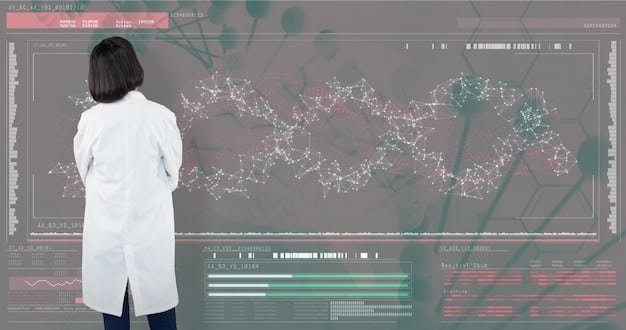AI-Driven Clinical Decision Support: Enhancing Accuracy in US Healthcare

AI-Driven Clinical Decision Support (CDS) systems are transforming healthcare in the US by leveraging artificial intelligence to improve diagnostic accuracy, reduce medical errors, and enhance patient outcomes through data-driven insights.
In the complex world of healthcare, accuracy and efficiency are paramount. AI-Driven Clinical Decision Support (CDS) systems are emerging as powerful tools to help clinicians make more informed decisions, ultimately improving patient care and reducing medical errors across the US.
The Rise of AI in Clinical Decision Making
Artificial intelligence is rapidly transforming various industries, and healthcare is no exception. The integration of AI into clinical decision-making processes holds immense potential for enhancing the quality and safety of patient care.
AI-Driven Clinical Decision Support systems are designed to analyze vast amounts of medical data, identify patterns, and provide clinicians with evidence-based recommendations. These systems can assist in diagnosis, treatment planning, and medication management, ultimately leading to better patient outcomes.

Benefits of AI-Driven CDS
- Improved diagnostic accuracy and reduced medical errors.
- Enhanced efficiency in clinical workflows.
- Personalized treatment recommendations based on patient-specific data.
- Better medication management and reduced adverse drug events.
By leveraging the power of AI, healthcare providers can make more informed decisions, leading to improved patient satisfaction and cost savings.
In conclusion, the rise of AI in clinical decision-making marks a significant step forward in healthcare, promising better patient outcomes and more efficient healthcare delivery.
How AI-Driven CDS Works
AI-Driven Clinical Decision Support systems work by leveraging various machine learning algorithms to analyze medical data and provide clinicians with actionable insights.
These systems typically involve several key components, including data ingestion, data processing, algorithm training, and recommendation generation. The data used by these systems can come from various sources, such as electronic health records (EHRs), medical imaging, and laboratory results.
Key Components of AI-Driven CDS
- Data Ingestion: Gathering data from various sources, such as EHRs, medical imaging, and lab results.
- Data Processing: Cleaning, transforming, and preparing the data for analysis.
- Algorithm Training: Training machine learning models to identify patterns and relationships in the data.
- Recommendation Generation: Providing clinicians with evidence-based recommendations based on the analysis.
The effectiveness of AI-Driven CDS systems depends on the quality and quantity of data used for training, as well as the sophistication of the algorithms employed.
In conclusion, AI-Driven CDS systems utilize advanced machine learning techniques to analyze medical data and provide clinicians with actionable insights, ultimately leading to better patient care.
Improving Diagnostic Accuracy with AI
One of the most significant benefits of AI-Driven Clinical Decision Support systems is their ability to improve diagnostic accuracy.
Traditional diagnostic processes often rely on clinicians’ experience and judgment, which can be subject to biases and human error. AI-Driven CDS systems can help mitigate these risks by providing objective, data-driven insights.

Examples of AI in Diagnostic Accuracy
- Medical Imaging: AI algorithms can analyze medical images, such as X-rays and MRIs, to detect subtle anomalies that may be missed by human radiologists.
- Pathology: AI can assist pathologists in identifying cancerous cells and other abnormalities in tissue samples.
- Genomics: AI can analyze genomic data to identify genetic markers associated with specific diseases, enabling earlier and more accurate diagnoses.
By augmenting clinicians’ diagnostic capabilities, AI-Driven CDS systems can help reduce diagnostic errors and improve patient outcomes.
In conclusion, AI-Driven CDS systems have the potential to significantly improve diagnostic accuracy by providing clinicians with objective, data-driven insights.
Reducing Medical Errors Through AI
Medical errors are a leading cause of preventable deaths in the US. AI-Driven Clinical Decision Support systems can play a crucial role in reducing these errors by providing real-time alerts and recommendations to clinicians.
These systems can identify potential medication errors, drug interactions, and other safety risks, helping clinicians make more informed decisions and avoid preventable harm.
How AI Reduces Medical Errors
AI-Driven CDS systems utilize various techniques to reduce medical errors, including:
– Alerting clinicians to potential drug interactions and contraindications.
– Providing reminders for preventive care interventions.
– Monitoring patient data for signs of deterioration or complications.
By providing real-time support and guidance, these systems can help clinicians avoid common pitfalls and ensure patient safety.
In conclusion, AI-Driven CDS systems have the potential to significantly reduce medical errors by providing real-time alerts and recommendations to clinicians.
Challenges and Limitations of AI-Driven CDS
While AI-Driven Clinical Decision Support systems offer numerous benefits, they also come with certain challenges and limitations.
One of the main challenges is the need for high-quality data. AI algorithms are only as good as the data they are trained on, so it is essential to ensure that the data used by these systems is accurate, complete, and representative of the patient population.
Limitations to Consider
- Data Quality: AI algorithms are only as good as the data they are trained on.
- Bias: AI algorithms can perpetuate and even amplify existing biases in the data.
- Explainability: It can be difficult to understand why an AI algorithm made a particular recommendation.
- Integration: Integrating AI-Driven CDS systems into existing clinical workflows can be challenging.
Addressing these challenges is crucial for realizing the full potential of AI-Driven CDS systems in healthcare.
In conclusion, while AI-Driven CDS systems offer numerous benefits, it is essential to be aware of their limitations and address the challenges associated with their implementation.
The Future of AI in Clinical Decision Support
The future of AI in clinical decision support is bright, with ongoing advancements in machine learning and data analytics promising even greater improvements in patient care.
As AI technology continues to evolve, we can expect to see more sophisticated CDS systems that are capable of providing personalized, evidence-based recommendations to clinicians in real-time.
Future Advances in AI for Clinical Support
Some of the key trends shaping the future of AI-Driven CDS include:
– The development of more sophisticated machine learning algorithms.
– The integration of AI with other emerging technologies, such as wearables and telehealth.
– The increasing availability of high-quality healthcare data.
By embracing these advancements, healthcare providers can unlock the full potential of AI-Driven CDS and transform the way they deliver care.
In conclusion, the future of AI in clinical decision support is promising, with ongoing advancements in technology and data analytics paving the way for even greater improvements in patient care.
| Key Point | Brief Description |
|---|---|
| 💡Improved Accuracy | AI enhances diagnostic precision and reduces errors. |
| ⏱️Enhanced Efficiency | AI automates tasks, speeding up clinical workflows. |
| 🛡️Reduced Errors | AI identifies risks and prevents medical errors. |
| 📈Future Growth | AI’s potential in healthcare is growing rapidly. |
FAQ
▼
AI-Driven Clinical Decision Support (CDS) systems use artificial intelligence to analyze medical data and provide clinicians with evidence-based recommendations to improve patient care.
▼
AI algorithms analyze medical images, pathology slides, and genomic data to detect subtle anomalies that may be missed by human clinicians, leading to more accurate diagnoses.
▼
Yes, AI-Driven CDS systems provide real-time alerts and recommendations to clinicians, helping them avoid medication errors, drug interactions, and other preventable safety risks.
▼
Limitations include the need for high-quality data, the potential for bias in algorithms, challenges in explaining AI recommendations, and difficulties integrating AI into existing workflows.
▼
The future involves more sophisticated machine learning algorithms, integration with wearables and telehealth, and greater availability of high-quality healthcare data, leading to personalized, real-time recommendations.
Conclusion
AI-Driven Clinical Decision Support systems are set to revolutionize healthcare in the US by enhancing accuracy, reducing medical errors, and improving patient outcomes. While challenges exist, the ongoing advancements in AI technology promise a future where clinical decisions are more informed, efficient, and patient-centered.





